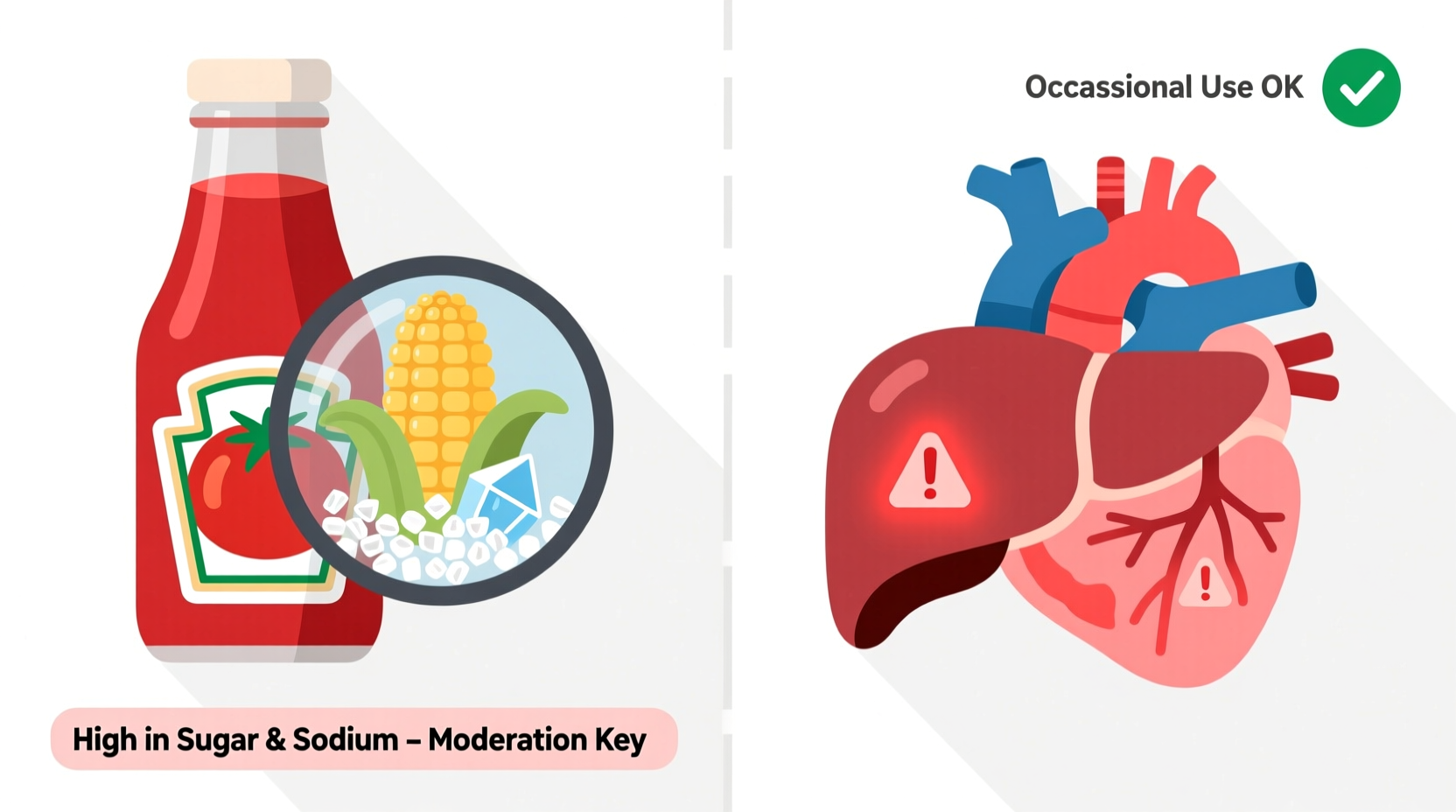Understanding Tomato Ketchup Composition
Before determining if tomato ketchup is bad for you, let's examine what's actually in this popular condiment. Traditional tomato ketchup primarily consists of tomato concentrate, vinegar, sugar, salt, and various spices. The USDA FoodData Central shows that one tablespoon (17g) of standard ketchup typically contains:
| Nutrient | Amount per Tbsp | % Daily Value |
|---|---|---|
| Calories | 15 | 1% |
| Total Sugar | 4g | 8% |
| Sodium | 150mg | 6% |
| Lycopene | 2.5mg | - |
Unlike many assume, tomato ketchup isn't just empty calories. The tomato base provides lycopene, a powerful antioxidant that becomes more bioavailable through the cooking process used in ketchup production. According to research published in the American Journal of Clinical Nutrition, processed tomato products like ketchup actually deliver more absorbable lycopene than raw tomatoes.

Health Considerations: Sugar Content Analysis
The primary health concern with conventional tomato ketchup is its sugar content. With approximately 4 grams per tablespoon, consuming multiple servings—as many do with burgers, fries, or other dishes—can quickly add up. The American Heart Association recommends no more than 25g of added sugar daily for women and 36g for men. Just three tablespoons of ketchup would account for nearly half a woman's daily recommended limit.
However, not all ketchups are created equal. Many brands now offer reduced-sugar or sugar-free alternatives using natural sweeteners like stevia or monk fruit. When evaluating is store-bought tomato ketchup bad for you, check the label for:
- Total sugar content per serving
- Type of sweeteners used
- Presence of artificial colors or preservatives
- Sodium levels
Sodium Levels and Heart Health
Sodium is another component that raises questions about whether tomato ketchup is bad for your heart. With 150mg per tablespoon, ketchup contributes to your daily sodium intake, which the National Heart, Lung, and Blood Institute recommends keeping below 2,300mg. For those with hypertension or at risk for heart disease, this becomes particularly relevant.
The good news? Many brands now offer low-sodium versions that reduce sodium content by 25-50% without compromising flavor. When comparing tomato ketchup vs low sodium alternatives, look for products that use potassium chloride instead of sodium chloride for salt replacement, as this provides a similar taste profile with less impact on blood pressure.
Benefits You Might Not Know About
Despite common concerns about is ketchup unhealthy, there are legitimate health benefits to consider. The tomato base provides significant lycopene, which numerous studies have linked to reduced risk of certain cancers and heart disease. Research from the National Cancer Institute suggests that lycopene may help protect against prostate cancer specifically.
Additionally, the vinegar content in ketchup has potential benefits for blood sugar regulation. A study in Medscape General Medicine found that vinegar consumption before meals can improve insulin sensitivity, which may be particularly beneficial for those with prediabetes or type 2 diabetes.
Practical Consumption Guidelines
So how much tomato ketchup is safe to eat daily? The answer depends on your overall diet and health status. For most healthy adults, 1-2 tablespoons per day as part of a balanced diet poses minimal risk. Consider these practical tips:
- Measure your portions instead of free-pouring from the bottle
- Choose brands with recognizable ingredients and lower sugar content
- Look for organic options that avoid high-fructose corn syrup
- Consider making your own ketchup to control ingredients
- Balance ketchup consumption with plenty of whole foods
For those with specific health conditions like diabetes, hypertension, or kidney disease, consult with your healthcare provider about appropriate consumption levels. The Centers for Disease Control and Prevention emphasizes that individual dietary needs vary based on health status, age, and activity level.
Special Considerations for Different Groups
When evaluating is tomato ketchup bad for children, consider that children have lower daily calorie and sugar needs. The American Academy of Pediatrics recommends limiting added sugars to less than 25g per day for children over 2 years old. With ketchup often accompanying popular children's foods like chicken nuggets and hot dogs, it can contribute significantly to their daily sugar intake.
For individuals following specific dietary patterns:
- Keto dieters: Standard ketchup is generally not keto-friendly due to sugar content, but sugar-free versions may fit within macros
- Vegans: Most ketchup is naturally vegan, but check for sugar processing methods if strict
- Those with GERD: The acidity may trigger symptoms in some individuals
Making Healthier Choices at the Grocery Store
When determining what's the healthiest tomato ketchup, focus on these label-reading strategies:
- Check the sugar content per serving (aim for under 3g per tbsp)
- Look for products using cane sugar instead of high-fructose corn syrup
- Verify tomato concentrate is the first ingredient
- Check sodium levels (under 100mg per tbsp is ideal)
- Avoid artificial colors and preservatives when possible
Brands like Heinz Simply, Annie's Organic, and Primal Kitchen offer cleaner ingredient profiles that address common concerns about is commercial ketchup bad for you. Alternatively, making your own ketchup allows complete control over ingredients—simply blend tomato paste with vinegar, a touch of sweetener, and spices.
Final Assessment: Is Tomato Ketchup Bad for You?
The answer to is tomato ketchup unhealthy isn't black and white. When consumed in moderation as part of a balanced diet, tomato ketchup provides beneficial lycopene without significant health risks for most people. The primary concerns are excessive sugar and sodium in some varieties—issues easily mitigated by choosing better options and practicing portion control.
As with most foods, context matters. Ketchup on an occasional burger differs significantly from daily consumption with multiple meals. By understanding the nutritional profile and making informed choices, you can enjoy this classic condiment without compromising your health goals.











 浙公网安备
33010002000092号
浙公网安备
33010002000092号 浙B2-20120091-4
浙B2-20120091-4